“His Silicon Soul”
Written by Marty Isenberg, Robert N. Skir
Directed by Boyd Kirkland
Episode #060
Music Composed by Carl Johnson, Harvey R. Cohen
Animation by Dong Yang Animation Co., LTD.
Original Airdate—November 20th, 1992
Plot:“Batman” wakes up in a crate, and quickly discovers he’s actually a robot duplicate, created by the supercomputer HARDAC as a back up plan to take over the world
“His Silicon Soul,” one of my favorite episodes, confronts an existential question at the heart of the series. If someone acts like Batman, can they in fact be Batman?
“His Silicon Soul” is a direct sequel to “Heart of Steel,” though if you haven’t seen it, an expository thief helpfully explains a supercomputer once tried to take over Gotham by making robot duplicates of important people. And as much as that two-parter relied on Blade Runner for inspiration, “His Silicon Soul,” is even more Philip K. Dick-ish by adding in the existential concerns of We Can Remember it For You Wholesale and A Scanner Darkly. The unnamed Batman Android (herewith known as Batmandroid) has memories of being Bruce Wayne and Batman, and therefore believes itself to be Batman. When it becomes undeniable that he has a mechanized body, Batmandroid rationalizes that he’s still Bruce Wayne, just stuck in a robot.
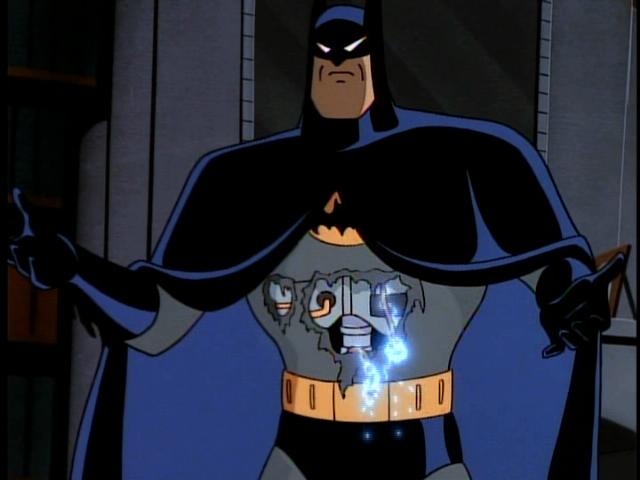
Marty Isenberg and Robert Skir, from the title on down, always treat Batmandroid as a person, not a thing, one that has hopes and fears and needs, one that lives and dies. That Batmandroid is wearing down, that in some ways he’s more mortal than Batman, is a plot point. Batmandroid’s humanity serves as the every-five-episode reminder that Kevin Conroy is really really good you guys. Batmandroid’s desperate pleas for help to Alfred are devastating. From Batmandroid’s point of view, he’s trapped in a horrible nightmare, and his closest family member is running away in fear. It’s goddamn heartbreaking.
While the writers treat Batmandroid as human, that respect is not shared by the human characters. Batman, Alfred, and robot maker Karl Rossum (William Sanderson reprises his role) are careful to only refer to Batmandroid as “it” and “just a robot. Period.” Karl, who once thought he could replace humanity with robots, has completely rejected that ideology to go live on a farm (though he’s still using giant robots to help him). It’s Karl that makes a strong distinction between what Batmandroid has, “data,” “cold, hard facts,” and memories: “Your first kiss? Your favorite song? The last time you tasted a really good steak?” Memories are facts with strong emotional components. On a metatextual level, Rossum’s examples show the difference between what a writer knows about their characters versus what a person knows about themselves. Does anyone know what Bruce Wayne’s favorite song is? Is that what makes him a person, and not just an idea?
Batmandroid’s existential crisis recalls “Perchance to Dream,” where Bruce Wayne wakes up with memories of being Batman despite everyone telling him he’s not. But Batman, and thus Batmandroid, is too much the detective to just believe what people tell him, and must discover the truth for himself. Batmandroid’s greatest need is answers.
I described “Perchance to Dream” as “For the Man Who Has Everything” but with Batman, and by the same token “His Silicon Soul” feels like a Bizarro story, but with Batman. Batmandroid is another misfit of science, the monster who has every reason to believe he is the hero of the story, and who tries to do everything right but is still a threat to the world. Batmandroid fights crime, solves mysteries, risks his own life to save Rossum. But as long as he’s in denial about who he really is, he can be manipulated by HARDAC into using “the information network this computer is linked with” (aka “the internet”) to destroy the world. Batmandroid is the most literal dark reflection of Batman the series has provided so far.

“His Silicon Soul” follows up on a lot of themes from the series, especially those found in the last few episodes. Here’s another villain who wants to save the world by destroying humanity. There’s even another Freudian swordfight between generations of Batmen for control of the planet, only this time Batman is the older generation, and Batmandroid the inevitable replacement. Here’s another red-eyed, cybernetically enhanced Batman who is temporarily freed from human frailty only to have technology fail and be faced with his own mortality. And, of course, here’s another hero inspired by Batman and an apparent do-gooder who hides a monster underneath, a monster revealed when the left half of his face is destroyed.
While not as outright frightening as “Heart of Steel,” “His Silicon Soul” still has moments of terror, especially the fight in the Batcave. This is the third time Batman’s secret lair, his sanctum sanctorum, has been invaded, and this time it leads to a brutal fight. If the worst of villains can get into the Batcave, then Batman truly isn’t ever safe. Even more horrifying moment, by far, is when the Batmandroid takes off his mask. At first, it looks like he’s taking off the Batman mask, but he actually takes off both the Batman and Bruce Wayne mask, revealing his steel skull. The squicking sound effect that accompanies that reveal makes the whole thing one hundred times worse.
But it sets up the finale perfectly. Like Ra’s al Ghul, Batman cannot defeat his replacement in a fight, so instead he teaches the future generation to be better. He impresses on Batmandroid the importance of human life, how Batmandroid is too much like Batman to kill and thus cannot aid HARDAC in his plan. In a fit of rebellion, Batmandroid saves the world by punching out the Batcomputer, sacrificing his own life. In a sign of respect, Batman removes just the Batman mask from the Batmandroid’s head. To Bruce, Batmandorid was neither the superhuman Batman or the inhuman metal skeleton, but the very human layer in between.
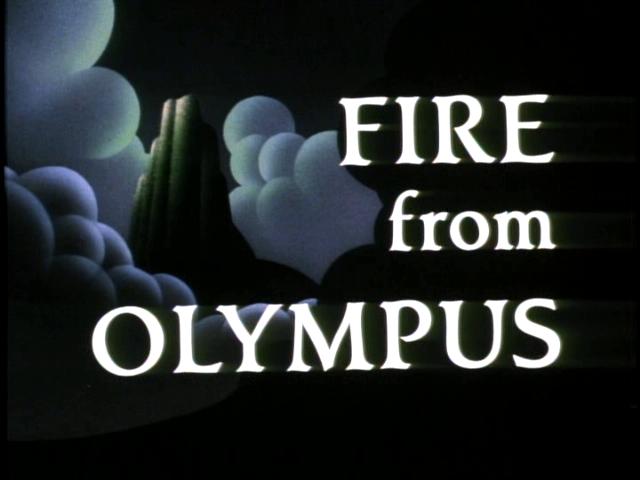
“Fire from Olympus”
Written by Judith and Garfield Reeves-Stevens
Directed by Dan Riba
Episode #062
Music Composed by Shirley Walker
Animation by Dong Yang Animation Co., LTD.
Original Airdate—May 24th, 1993
Plot: A whistleblower is struck by lightening on a clear day, and all evidence points to Maxie Zeus, a shipping magnate that believes he is actually the king of the gods.
Maxie Zeus was created in 1979 by Denny O’Neil, which just goes to show they can’t all be Ra’s al Ghul. I have never been able to take Maxie Zeus seriously as a villain, and this episode shows exactly why.
“Too crazy” is a weird complaint about a Batman villain, but for most of Batman’s rogues, their obsessions, manias, and phobias are what make them dangerous. For Maxie, his delusion that he is the god Zeus is a weakness that causes him to make mistake after mistake. Throughout the episode, his gang, Clio, Alex, and Unnamed, constantly tell Maxie to stop—Don’t antagonize Batman. Don’t attack the police. Don’t tie Clio to the lightning gun—and he never listens to them, to everyone’s detriment. The good years with this guy must have been really, really good because it’s hard to see why they still follow him when he’s this far gone.
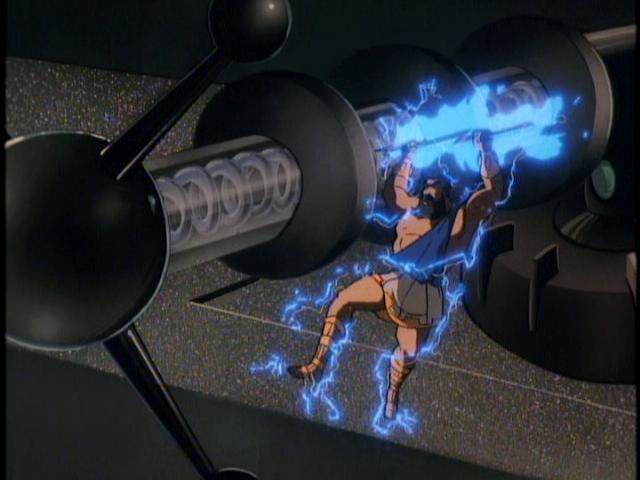
This idiot is never a threat to Batman. For all that he has gargoyle gun turrets, lightning cannons, and a floor full of deadly animals, Batman can just pull a grenade out of his ass (almost literally) to get around it all. Maxie is mostly a threat to himself, leaping off a roof to grab his magic wand. Standards and Practices is the only reason Maxie’s self-inflicted head-first fall onto marble didn’t end with brain splatter. And the episode only lasts past the first commercial break because Batman, investigating a mysterious lightning strike, doesn’t immediately punch out the man holding the lightning gun and calling himself Zeus.
The episode takes stabs at making the character work, but each attempt comes up short. Clio suggests Maxie lost in his own dream world is another dark reflection of Batman, but Batman doesn’t think he’s actually a bat. Clio’s affection for Maxie allows the possibility that Maxie is a tragic villain, like Two-Face, one who might be saved. But, except for a single line, Maxie runs far far away from redemption so he can go blow up a blimp. The first scene suggests that maybe, maybe Maxie really is a god. In the comics, where Wonder Woman is a going concern, that’s a possibility, but Batman: the Animated Series has gone to lengths to show that magic does not exist, so Maxie is definitely just an idiot in a toga.

Which is a shame because so much of the rest of the episode is so good. From the opening shot of a lit match, “Fire from Olympus” is gorgeously animated, Dong Yang’s best work since “Almost Got ‘Im.” The blimp crash alone, a fiery hellscape in the streets of Gotham, shows how scary a villain Maxie could be, were he not a moron. Batman’s infiltration of Maximilian Shipping, and his fights against a python and a boar, are awfully dramatic, though pointless when you remember he should have taken out Zeus in the first act, not the third.
Similarly, the voice acting is great as well. Bess Armstrong is effective as Maxie’s long suffering assistant Clio, and even Steve Susskind plays Maxie’s pomposity well. In the very first scene, when the silhouetted Maxie gets out the car to deliver divine justice, the voice is appropriately ominous. But as the episode goes on, and Maxie is obviously delusional, the disconnect becomes grating without ever getting to humorous or campy. His lines are just tiresome, especially when he quotes “Ozymandias.” (Really, Judith and Garfield Reeves-Stevens? A Watchmen reference?)
In the end, Zeus is wheeled into Arkham, going down the same gallery as Batman did in “Fear of Victory,” and even sees the same three villains, Poison Ivy, Two-Face, and the Joker. This is supposed to work on two levels: one, that Maxie is still delusional and sees the other villains as Greek gods; and two, that he’s now one of them, a member of the inner rogues. But this fails on both levels. For one, he gets the gods wrong. Sure, Ivy as Demeter is a gimme, but as reasonable Two-Face as Janus is, Janus isn’t Greek. And if the Joker is any Greek god, he’s closer to Eris than he is to Hermes. But for two, man, Maxie Zeus is not close to being one of the inner rogues gallery, he’s just another one time loser, never, ever to be seen again.
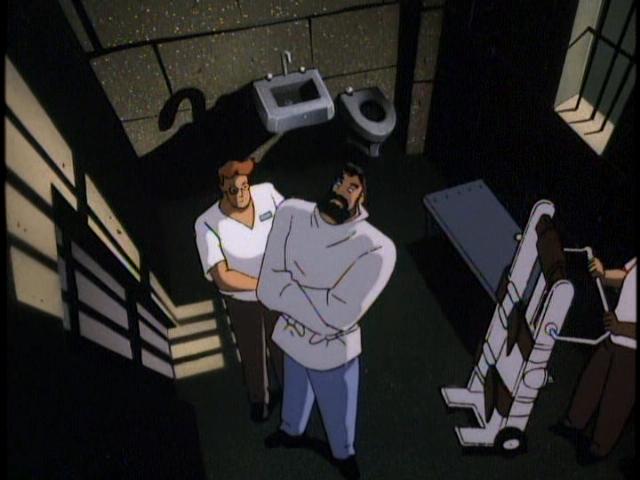
Steven Padnick is a freelance writer and editor. By day. You can find more of his writing and funny pictures at padnick.tumblr.com.










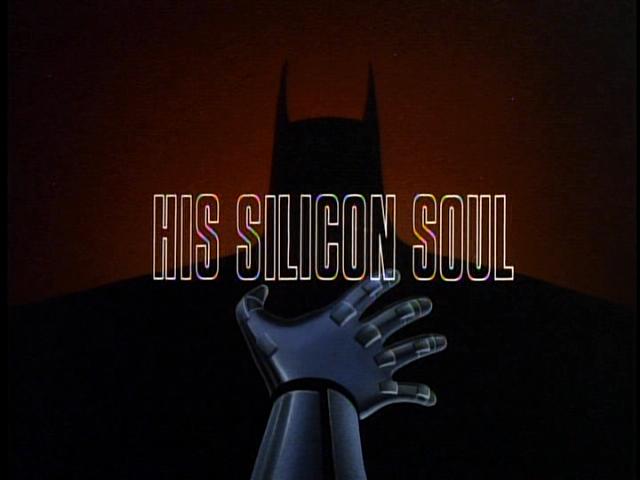
“Does anyone know what Bruce Wayne’s favorite song is?”
“Bat Out of Hell?” (Is that a song or just an album?) Although there’s some evidence for “Am I Blue?”
You forgot to mention the best part of “Fire From Olympus”: Shirley Walker’s absolutely magnificent, epic score, one of her best in the entire series. It’s so good that there’s an extended excerpt from it in the medley at the start of the first soundtrack album set as well as the full score being included on the second set.
I don’t mind the episode so much. Sure, Maxie isn’t a very credible threat, but I don’t see the story that way. It’s just kind of poignant to see Clio and Alex’s sad concern for their former friend’s deterioration. I think it’s a nice twist on the formula. Usually these mad villains are surrounded by henchmen who unquestioningly obey their mad instructions, who fit into their themed delusions (like the Mickey Dolenz-voiced twins from “Two-Face Part 2”), or who are as nuts as they are (Harley). Sometimes we see someone who knew them before and laments what they’ve become, but those are people like Grace who were never part of their criminal lives. Here we see characters who are in the position of being the mad criminal’s subordinates but are not mere goons or enablers; they’re friends whose loyalty compels them to stay on but who hate seeing what’s happening to the boss. It isn’t Maxie that makes the episode work; it’s the people around him. I think it’s a nice, subversively realistic twist on the “mad supervillain” trope, in that the madness isn’t just a plot device to generate exotic villainy but is dealt with on a more human level.
And it’s kind of a critique of the trope as well, because it shows that a genuinely insane person, one who’s lost touch with reality, would not be a very effective villain after all. Characters like the Joker and Ivy and Two-Face and the rest, while definitely psychopathic or suffering from various personality disorders, would not actually meet the legal definition for insanity, because they’re aware of the nature of the reality around them and recognize the criminality of their actions. Maxie Zeus is genuinely delusional and schizophrenic, so he can’t actually pull off villainy on their level. Which is really kind of a damning commentary on the rest of the Arkham population, because it shows they’re more in control of themselves than they let on.
Then again, maybe I’m just reading too much into it because the music and animation are so damn wonderful.
I believe that a villian is more interessting when he or she is a twisted reflection of the hero. Both “His Silicon Soul” and “Fire from Olympus” have traits of this, the first episode way more than the last; how else could it be with an episode starring a robot duplicate of Batman. As inhuman HARDAC’s agenda is, the Batmandroid does have a point that it is Wayne’s quest taken to the logical extreme. Of course, by faking his own death, Batman confronts the android with the harsh truth, that in order to continue with HARDAC’s plan, Batmandroid would have to willfully take a human life (and certainely many more) for the alleged “greater good.” Since the robot is hardwired (pun intended) with Bruce Wayne’s belief in the value of every single human life, this is unacceptable for him.
Maxie Zeus from “Fire from Olympus” can hardly be called a dark version of batman; he is a delusional man who has lost all contact with the real world. Clio’s suggestion that Batman could relate to his situation seems like a joke at first, but remember her perspective. Sure, the viewers know that Batman is far from a lunatic, but only because they follow him around. The ordinary men and women of Gotham only get to see a stranger wearing a bat costume. What would your thoughts be of a man who dresses like a flying rodent and swoops down every night from the rooftops?
On a meta level the episode has a motive that is as old as “Don Quixote”: the danger of obsession and dwelling to deep into a fantasy. As much as I love “Batman: The animated series”, I am aware that it is only imaginery fun, a short respite from the mundane world. Should some excentric billionaire ever try to be a costumed vigilante in the real world, I fear he would be more like Maxie Zeus than Bruce Wayne.
I liked the Ozymandias quote. I did not think it had anything to do with Watchmen. Just the theme of a once great guy reduced to nothing. Which I believe is what they are trying so very hard to convince us about the life of Maxie Zeus. Of course, I could be biased. It is very simply my favourite poem of all time.
Bruce Wayne’s favorite song: Surely it is this. :)
I really liked Fire From Olympus when I was little. When I rewatched all the episodes with my wife, I realized it was pretty dumb, but I have a hard time admitting it’s bad even today. The only other episode I feel more strongly this way about is Bane, which I fear for your review because I know it ain’t good TV, but damn to I love that episode anyway.
I remember from my history lessons that Janus was a Greek god… But I googled him now, and he is Roman. I guess that must be a common misconception.